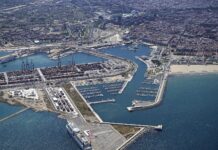
The largest container operator in Russia, Global Ports has announced new services to improve its operations and increase its efficiency.
Global Ports has launched a service for digital issuance of orders for the loading of export containers at Petrolesport (PLP) and Ust-Luga Container Terminal (ULCT).
The customers of all marine terminals of the Group in the North-West of Russia will be able now to manage export shipments via the Global Ports Unified Customer Portal after the First Container Terminal (FCT) which in 2020 became the first terminal in Russia that transferred to a fully paperless export management system for export containers.
“Now customers of PLP and ULCT do not need to reenter data into the Federal Customs Service (FCS) system – the information in the customer’s account on our portal is automatically transferred to the customs authority in electronic form,” said Alexey Ermolin, Chief Information Officer of Global Ports, who revealed plans for implementing the service at Vostochnaya Stevedoring Company, located in the deep-water port of Vostochny, in the upcoming September.
With the new digital tool, Global Ports aims to further accelerate the processes of cargo shipments, while the total volume of electronic cargo documents at the Group’s terminals reached 80%.
The technology of the digital exchange of legally binding documents with the customs authority is based on Global Ports’ Customer Portal and Sea Port’s Portal software functionality, according to a statement.
“Once a digital order has been issued, the terminal may start loading a container onto a vessel immediately without additional approval, further speeding up the process. All participants of the process – the forwarding company, the customs authority, the terminal and the shipping line – have online access to information about the status at all stages of the process,” explained Global Ports.
The information operator of the service is ROLIS, an Information Technology (IT)-solutions developer which is a part of Global Ports Group. ROLIS is certified to transmit information to the FCS in electronic form.
Earlier in June, the Russian operator introduced a goods’ marking service at Yanino Logistics Park, which launched at the logistics park customs warehouse in partnership with Global E-trade Solutions, the goods marking operator.
Yanino Logistics Park and Global E-Trade Solutions now offer the labelling of many consumer items, including footwear, consumer goods, tyres and wheel covers, perfumes, photo equipment, and bicycles. The warehouse and operator’s equipment have the capacity to offer marking capability of up to 50,000 items per day.
In the future, the warehouse will be equipped with refrigerating chambers and technical vision for defining the quality class of marking codes. This will allow the marking of dairy products (cheese, ice cream, butter) and experimental groups of goods – packaged water and other drinks, according to an announcement.
Yanino’s warehouse will be able to produce a marking volume of dairy products and packaged drinks of up to 20,000 codes a day, while the customs warehouse also plans to take part in an experiment of marking biologically active additives (BAA).
Marking was introduced in the Russian Federation in 2016 and is a mandatory requirement of Russian legislation for the specific groups of imported goods. Goods are tracked by the marked numeric code through the entire logistics chain to prevent counterfeit.
“At the customs warehouse in Yanino, it is possible to mark goods imported into Russia both by land and via sea terminals,” noted Ivan Radchenko, General Manager of Yanino Logistic Park, who believes the new service will allow clients to optimise their logistics.








